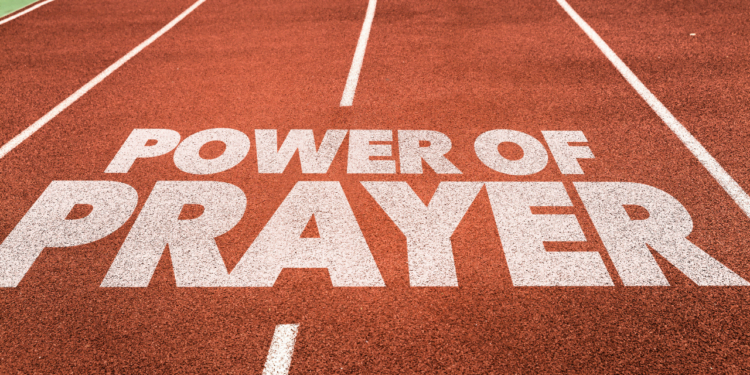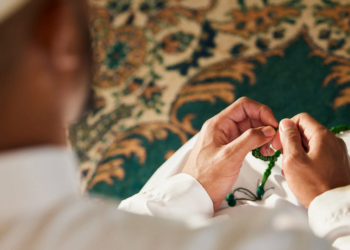No products in the cart.
Unveiling the Essence of Prayers: A Comprehensive Guide
This post contains affiliate links.
Prayer is a deeply rooted spiritual practice across various cultures and religions, serving as a means of communication with a higher power or divine being. It is a profound way to express gratitude, seek guidance, request blessings, or connect with the spiritual realm.
Regardless of the specific religious or cultural context, prayers are fundamentally about connecting beyond the physical world and tapping into a source of strength, peace, and wisdom.
The act of praying involves both verbal and non-verbal communication with the divine. Verbal prayers often consist of spoken words, chants, hymns, or recitations that convey one’s intentions, desires, or praises.
Conversely, nonverbal prayers encompass silent contemplation, meditation, or even physical gestures that symbolize reverence and devotion. These varied forms of expression highlight the flexibility and adaptability of prayer practices to suit individual preferences and beliefs.
Central to the concept of prayers is the idea of faith and belief. Prayers operate on the premise that a spiritual force or energy can respond to human intentions and petitions. The power of prayer lies in asking for divine intervention and the underlying conviction that the universe is inherently responsive to human needs and desires.
This belief in the efficacy of prayers reinforces the notion that thoughts and emotions have the potential to influence outcomes and manifest positive changes in one’s life.
Moreover, prayers are imbued with a sense of intentionality and mindfulness. When individuals engage in prayer, they focus their thoughts, emotions, and energies toward a specific purpose or goal. This concentrated mental and emotional effort is believed to resonate with the divine realm, aligning one’s intentions with the cosmic order.
By cultivating a state of receptivity and openness through prayer, individuals can attune themselves to higher frequencies of consciousness and invite spiritual blessings into their lives.
In essence, prayers function as a spiritual technology that transcends the boundaries of the material world and facilitates a deeper connection with the divine. Prayers serve as a sacred pathway to inner transformation, healing, and communion with the transcendent, whether offered in times of joy, sorrow, gratitude, or supplication.
By understanding the true essence of prayers and embracing their transformative potential, individuals can harness the power of spiritual communion to navigate life’s challenges and cultivate a sense of peace, purpose, and divine connection.
Different Types of Prayers Across Cultures
Prayer is fundamental to various cultures worldwide, each with unique practices and beliefs. Understanding the diverse types of prayers can offer insights into the rich tapestry of human spirituality and expression.
In Christianity, prayers are often categorized into different types based on their purpose and form. These include prayers of adoration, where individuals praise and glorify the divine; prayers of petition, which involve asking for help or blessings; prayers of thanksgiving, expressing gratitude; and prayers of confession, seeking forgiveness for wrongdoing.
In Islam, one of the five pillars of the faith is Salah, the Islamic form of prayer. Muslims perform ritual prayers five times a day facing the Kaaba in Mecca. These prayers, known as Salat, involve recitations from the Quran and specific bodily movements performed in a prescribed manner as a form of worship and submission to Allah.
Buddhism emphasizes the practice of meditation as a form of prayer. Buddhists seek to cultivate inner peace, wisdom, and compassion through mindfulness and reflection. Mantras, chants, and sutras are also recited as forms of spiritual communication and devotion to the Buddha and other enlightened beings.
Hinduism encompasses a wide array of prayers and rituals, reflecting the diversity within the religion. Bhajans (devotional songs), aartis (ceremonial offerings of light), and pujas (ritual worship) are commonly practiced to invoke the presence and blessings of various deities such as Vishnu, Shiva, or Devi.
Indigenous cultures worldwide have unique prayer forms that are deeply connected to nature, ancestors, and the spirit world. These prayers often involve rituals, dances, and ceremonies that honor the earth, seek guidance from spirits, and maintain balance and harmony within the community.
Despite the variations in form and practice, prayers across cultures share a common intent: to establish a connection with the divine, seek guidance, offer gratitude, and experience transcendence. Whether through spoken words, silent contemplation, or sacred rituals, prayers are a profound expression of human spirituality and a means to cultivate inner peace and harmony.
The Power of Intention and Belief in Prayer
Prayers are deeply rooted in individuals’ beliefs, intentions, and faith, seeking solace, guidance, or blessings. The act of prayer transcends religious boundaries and cultural differences, emphasizing a universal human desire to connect with a higher power or divine entity. Central to the concept of prayer is the power of intention and belief, which plays a crucial role in shaping the effectiveness and outcomes of the prayers offered.
When individuals engage in prayer, they usually do so with a specific intention. This intention serves as the driving force behind the prayer, shaping the words, emotions, and energies conveyed during praying. Whether seeking healing, forgiveness, or guidance, the intention behind a prayer sets the stage for manifesting desired outcomes.
By focusing on a clear and heartfelt intention, individuals align their thoughts and energies with the purpose of their prayers, paving the way for a deeper connection with the divine.
Belief is another essential component that influences the efficacy of prayers. The strength of one’s faith and belief in the power of prayer can significantly impact the outcomes experienced. Belief is a catalyst that propels the intentions expressed in prayer toward fruition. When individuals wholeheartedly believe in the possibility of their prayers being answered, they create a powerful energy field of positivity and receptivity that enhances the effectiveness of their prayers.
Numerous spiritual traditions and teachings emphasize the significance of faith and belief in prayer, highlighting the transformative power of a steadfast conviction in the divine. Through unwavering faith, individuals cultivate a sense of trust and surrender, allowing them to release their worries and fears while embracing peace and acceptance.
This state of receptivity opens the doors for divine blessings, grace, and guidance to flow into their lives, manifesting the outcomes they seek through their prayers.
In essence, the power of intention and belief in prayer lies in their profound influence over the spiritual and energetic dimensions of human existence. By aligning their intentions with their beliefs, individuals can harness the forces of the universe to co-create their realities in harmony with the divine will.
When prayers are infused with pure intentions, heartfelt emotions, and unwavering faith, they become potent tools for transformation, healing, and spiritual growth, bringing solace, blessings, and miracles into the lives of those who offer them sincerely.
Scientific Perspectives on the Efficacy of Prayer
Prayer, communicating with a higher power, has been a subject of interest for scientific inquiry over the years. Various studies have explored the potential effects of prayer on health, well-being, and even the surrounding environment. While prayer is often associated with spirituality and faith, researchers have attempted to understand its impacts through a more empirical lens.
One of the central debates surrounding the efficacy of prayer from a scientific standpoint is whether it has measurable effects on outcomes such as healing from illness or achieving personal goals. Some studies suggest that prayer can positively influence health, with individuals reporting improved conditions after engaging in prayer practices. However, the mechanisms through which these effects occur remain a topic of ongoing research and discussion.
Furthermore, researchers have delved into the psychological and neurological mechanisms that may underpin the effects of prayer. Studies using brain imaging techniques have shown that prayer can activate specific regions of the brain associated with feelings of peace, empathy, and connection. This suggests that prayer may physically affect one’s emotional state and well-being.
Moreover, the power of collective prayer or intention has also garnered interest among scientists. The idea that group prayer or focused intention can influence outcomes in the physical world has been explored through studies on the effects of prayer on the environment, social dynamics, and even global events.
While the results of such studies are often debated within the scientific community, they have raised thought-provoking questions about the interconnectedness of consciousness and the universe.
Scientific perspectives on the efficacy of prayer highlight the complex relationship between mind, body, and spirituality. While more research is needed to understand the mechanisms through which prayer works fully, the existing studies offer intriguing insights into the potential impacts of this age-old practice on human experiences and the world at large.
Understanding How to Enhance the Effectiveness of Your Prayers
Prayer is a practice that holds significant importance in many cultures and religions worldwide. It is a way of communicating with a higher power or expressing gratitude, hopes, and desires. While prayer is deeply personal and can vary widely from person to person, some universal tips can help enhance your prayer’s effectiveness.
One important aspect to consider when praying is the power of intention. When you pray with a clear intention, you focus your energy and thoughts toward a specific goal or outcome. By being specific in your prayers and visualizing the desired result, you are more likely to attract positive energies and manifest your intentions into reality.
Belief also plays a crucial role in the effectiveness of prayer. When you believe wholeheartedly in the power of your prayers and in the existence of a higher power that is listening, you send out strong vibrations into the universe. This unwavering faith can help strengthen your connection to the divine and increase the likelihood of your prayers being answered.
Consistency is another key factor in making your prayers more effective. Establishing a regular prayer routine helps create a sense of discipline and dedication to your spiritual practice. Whether you pray daily, weekly, or on specific occasions, maintaining a consistent prayer schedule can help deepen your connection with the divine and align your intentions with your actions.
Gratitude is also essential in enhancing the impact of your prayers. Expressing gratitude for the blessings in your life, no matter how big or small, can help shift your focus toward positivity and abundance. When you approach your prayers with a grateful heart, you are opening yourself up to receiving more blessings and opportunities for growth.
Additionally, it can be beneficial to surround yourself with a supportive community of like-minded individuals who share your beliefs and values. Joining a religious group, attending spiritual gatherings, or participating in prayer circles can help amplify the energy of your prayers and create a sense of unity and connection with others.
By incorporating these tips into your prayer practice, you can enhance the effectiveness of your prayers and cultivate a deeper sense of spirituality and connection with the divine. Remember that the power of prayer lies not only in the words you speak but also in the intentions, beliefs, and emotions behind them. Trust in the process, stay consistent and be open to the infinite possibilities that prayer can bring into your life.
Conclusion
As we delve into the multifaceted realm of prayers, we uncover a practice that transcends cultural boundaries and embodies the essence of human connection to the divine. Understanding prayers as a communication channel with a higher power enables individuals to seek solace, guidance, and strength in times of need.
People from diverse cultures express their reverence and faith in the unseen forces that govern the universe through various forms such as supplication, thanksgiving, intercession, and meditation.
Across different cultures and faith traditions, prayers take on unique forms and rituals that reflect the beliefs and values of the practitioners. From the Islamic tradition of Salah to the Buddhist practice of chanting, each prayer modality serves as a vehicle for spiritual growth and self-reflection. Through these rituals, individuals cultivate a sense of mindfulness and inner peace, fostering a harmonious relationship with themselves and the world around them.
Central to the efficacy of prayers is the power of intention and belief. By aligning one’s thoughts, emotions, and actions with the desired outcome, individuals harness the energy needed to manifest their aspirations into reality. Whether seeking healing, guidance, or protection, a sincere belief in the transformative nature of prayers amplifies their potency and influence on personal and collective well-being.
From a scientific perspective, the efficacy of prayers has been a subject of debate and exploration. While empirical studies on the direct impact of prayer on specific outcomes remain inconclusive, the field of quantum physics sheds light on the interconnectedness of consciousness and the material world. The notion that thoughts and intentions can influence reality at a quantum level invites contemplation on the profound implications of prayer beyond conventional understanding.
Several tips can be integrated into daily practice to enhance the effectiveness of one’s prayers. Cultivating a sense of gratitude, clarity of intention, and emotional alignment with the desired outcome can amplify the vibrational frequency of prayers, thus increasing their resonance with the universal energies at play.
Engaging in acts of service, meditation, and self-reflection further deepens one’s connection to the divine source, paving the way for a more profound and transformative prayer experience.
In essence, prayers serve as a gateway to the infinite potential within each individual, offering a path to healing, transformation, and spiritual realization. By embracing the diversity of prayer practices, honoring the power of intention and belief, and integrating scientific insights into our understanding, we embark on a journey of personal growth and collective evolution.
May our prayers be filled with sincerity, compassion, and wisdom, guiding us toward a future illuminated by grace and divine blessings.
This post contains affiliate links.













